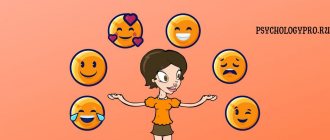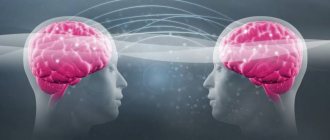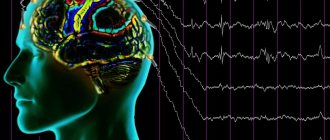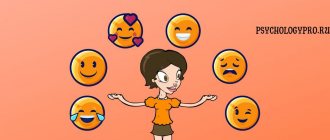Hello everyone, dear readers! Lyudmila Redkina is with you, and in this article we will talk about human intellectual abilities. The words “intellectual”, “intellectual” are firmly established in our everyday life, and everyone would like to be known in the company as a competent and intelligent person. A good friend of mine once taught a good lesson, he said: “It doesn’t matter at all who you stand in front of in your life, it’s not about age or status, but about the ability to communicate and the level of intelligence!” In his phrase, he almost quoted Winston Churchill, but this phrase was said so timely that I am guided by it to this day. So, you can learn how to present yourself correctly in society by reading about emotional intelligence (EQ). And below we will look at how to become smarter and increase your intelligence level (IQ).
Why do I need this?
The brain is still an organ that has not been fully studied. Some scientists claim that we use only 10% of the entire brain, others increase this figure, but one thing is clear - the main organ has unlimited work capabilities.
It is generally accepted that the brain is the laziest organ. If it is not developed, it will degrade. If you constantly load him with work, new neural connections will appear, and the person will become more flexible and adaptive in life.
These neural connections tend to disappear as quickly as they appear. Therefore, it is important to consolidate them. Developing intelligence does just that—it strengthens educated connections. With the help of this consolidation, memory, attention, thinking and other processes of our psyche develop.
Improving intellectual abilities
The belief that the formation of abilities occurred in childhood, and after that there is no point in maintaining the level, is erroneous. Developing intelligence and maintaining the level is possible at any age. Everyone has potential - it’s worth showing the willpower to unlock it.
The brain, like a muscle, should be constantly fully loaded. The development of intelligence is not facilitated by quick methods - books that promise to help in a week, pills, exercise equipment.
IQ tests
IQ tests are a snapshot of your current knowledge from different areas. Experts in the functioning of mental processes have developed tests for different age groups. You can find techniques for preschoolers, schoolchildren, teenagers and adults. Let's look at the most popular methods.
- “Is your IQ above average?” A method for determining your IQ level with pictures. A simple test that gives quick results.
- “IQ Test.” A very revealing test, since not only correct answers are taken into account, but calculation speed, analytics and other indicators are taken into account.
- "IQ test". Taking the test does not take much time, it is convenient to give answers and determine your development.
- “Eysenck's IQ test.” You have to answer 40 questions. This method in psychology is considered one of the best and most revealing.
Check out 15 more IQ tests.
If your results are less than expected, don't be discouraged! After all, any test assesses your preparedness for certain logical problems, but not your ingenuity, rationality and life wisdom, which determine your success. And self-development can be achieved not only with the help of IQ, but also with the help of books on personal growth.
What types of intelligence are there?
On the issue of mental abilities, it should be noted that everyone has their own intelligence, since there are a number of its varieties. By the way, they can be identified from childhood by the manner of communication, the interests of the child, his hobbies, thoughts, and reasoning.
- Analytical. The ability to analyze, compare, compare information, divide it into logical blocks, and identify relationships.
- Logical. A person is capable of reasoning, thinking and analysis without violating formal logic. This type has the ability to make logical, correct conclusions in the appropriate sequence.
- Critical. Receiving information, a person criticizes it, evaluates it, and easily weeds out everything superfluous, unnecessary, and incorrect. This is how a natural, pure opinion develops.
- Deductive. A person extracts individual, necessary information from the general volume, flow, and can formulate it perfectly. This type is able to generalize, find patterns in the interconnection of different information and group it into one single thing.
- Prognostic. The talent to plan, prevent, formulate future events in thoughts and at the same time keep in mind various options for solving a particular problem.
- Abstract thinking. A person can delve into the most complex abstract processes, most often this concerns mathematical and philosophical problems. These are brilliant individuals who are able to hold the most complex mathematical formulas and processes in their heads. They can quickly count addition, multiplication, and division of billions in seconds.
- Creative thinking. A person knows how to compare things of different importance from different sciences and quickly bring them to a common denominator. People are able to create, formulate various kinds of metaphors, decipher complex ideas and reduce them to a simplified level for easier understanding.
- Ability to concentrate. This point most likely applies to those who have great will and discipline, although without intelligence this would hardly be possible.
The human mind also has certain properties:
- Logic of architecture: everyone has a different degree of orderliness in their thinking. Someone thinks soberly, all thoughts are in “order,” while others have a chaotic, incoherent, chaotic mind.
- The breadth, depth of the human mind: the level of “smartness” of a person depends on this moment. If he is able to grasp a question, task, or object of thought more broadly and deeply, then he is smarter.
- Speed of performing mental operations. Here, perhaps, everything is clear. The faster a person thinks, the higher his thinking speed.
- Autonomy of thinking. Some people can think perfectly, regardless of the influence of external interference and factors. They are always calm, especially at the moment when they need to make the right decision, create an idea and bring it to life.
- Great RAM: It's about our memory. The better it is, the more information we can keep in our heads and use it at the right time. People with a good memory can recite poems by heart, retell books, multiply billions in their heads, divide them, formulate formulas.
So, we have studied the main components of the human mind that can be developed and increased. There are a lot of techniques for this, among which are the most common ones in accordance with their effectiveness.
Adviсe
So, we have decided that you need to give your brain rest only during sleep, the rest of the time it needs to be more loaded with different tasks. Let's look at how you can develop your IQ.
Wake up your logic
Logical thinking is an important component of intelligence. Therefore, you need to not let logic fall asleep in the everyday hustle and bustle. To do this, solve logical riddles. There are many books for developing logic starting from the age of 3. Train yourself and with your children by solving interesting tasks.
Remember and don't forget
In other words, try to train your memory - this is the best way to increase your intellectual abilities. To do this, look for tasks to remember the location of figures, points, words and phrases. Then check yourself immediately, after a certain time. There are other ways to develop memory.
Communicate while answering tough questions
In formulating answers to complex questions, you develop analytics. For example, among your like-minded people you can organize a discussion on the topic “why do people need 2 eyes” or “how to start a business with small capital.” Many people consider this to be empty chatter, but, as practice shows, people find a lot of useful things in such chatter and still actually start a business from scratch!
Love math
What really helps develop IQ is doing math. comparing numbers, understanding digital combinations, solving various problems develops strategy, analytics and logic.
There are many rules of mathematics that apply in everyday life, but we are not aware of them. For example, the “optimal stopping” rule is applicable when you need to make a choice from several quantities (objects, people, etc.). According to this rule, you should immediately consider 36.8% of the presented values, reject them and choose the first one that seems better than the rejected ones.
Mathematics for the development of intelligence
Playing a musical instrument
Many studies have been conducted on how music affects the brain and develops intelligence. In addition to the fact that a person who listens to and plays classical music becomes kind and calm, he also develops.
IQ is developed not by listening to music, but by playing an instrument. Especially on instruments such as piano, violin, guitar, accordion, bandura and others, where the hands perform different movements.
Get creative
Creative, creative thinking is now at a premium. Try to approach different problems creatively. For example, when making a decision, draw a picture of the problem, study every squiggle, and write down all the associations you have. Then match all the words, find a solution, a new approach to the problem.
This method is not new. This is how Leonardo da Vinci acted. It was he who began sketching his world-famous works this way.
Start learning foreign languages
You need to do this not only to be educated, but also to develop your brain and intellect. Read books in a foreign language, try to speak in the simplest phrases. Ideally, if you find a native speaker.
It's simple - get enough sleep
It has long been known that for the brain to function well, it needs to rest and have time to process information. Brain studies have shown that during the slow-wave sleep phase the organ masters the tasks of factual memory: dates, definitions and other educational issues. In the REM sleep phase, the brain masters human actions and behaviors stored in memory.
These methods will help you easily develop IQ if you set a goal. So don’t waste time and start improving your cognitive abilities!
Activities and exercises for middle school and adolescence
From the age of 10-12, in classes for the development of intelligence, you can focus on competition or on an entertaining and playful form of pastime with benefits for the mind and mood.
Perhaps the best answers for any parent to the question of how to develop intelligence in a schoolchild:
- olympiads and competitions (real and “game”, at school and at home between friends);
- entertaining competitions for solving logic problems;
- family, friendly and official chess tournaments;
- joint solving of Sudoku, solving crossword puzzles;
- guessing rebuses, logical riddles, tasks and puzzles for logic and ingenuity, and much more.
As a result of completing a course in the development of logical thinking and intelligence, a 10-12 year old child will not only be able to solve such complex problems that many adults may not be able to do, but also in many aspects of intellectual development will be two heads taller than their less purposeful counterparts. peers.
Exercises to increase intelligence
Below I will outline several exercises to increase IQ so that you can develop your intelligence throughout the day in any activity.
- Try to write more with your hand rather than typing letters on the keyboard.
- Walk around familiar places with your eyes closed.
- Go to work and school in different ways.
- Practice mental arithmetic.
- Read aloud sometimes, this is how different analyzers work.
- Buy yourself crossword puzzles occasionally.
- Learn to answer trivial questions in an original way.
Japanese development method
The Japanese system for the development of intelligence and memory was developed by a neurologist and professor from Japan named Ryuta Kawashima. The neurologist described the technique in the book “Train your brain. Japanese system for the development of intelligence and memory." It began selling in 2003, immediately becoming a bestseller.
To begin with, the book offers an understanding of the efficiency of the reader's brain. It also includes a set of simple tasks, methods, including a special technique that helps to periodically assess abilities.
The methods are based on high-speed mathematical problems and reading aloud. First, you are asked to take exercises - tests on mental arithmetic or memorizing words in a minute. Afterwards the reader moves on to solving mathematical problems. The emphasis is on the fact that you need to study every day, writing down reports. With prolonged work, there is a significant improvement in results.
Verification tests are performed at intervals of five days. A specific schedule is built - five days of classes, one day of ability testing.
The Japanese system for the development of intelligence and memory has received worldwide recognition for the simplicity of tasks and spending a minimum amount of time on them - 5-10 minutes.
Myths and misconceptions about intelligence
From this follows the erroneous belief that since the formation of the mind and brain abilities has already taken place, then intelligence is not something that needs to be looked after, that needs to be trained and developed. This is a special case of what I talk about in the article “Can you change yourself?”, in which I exposed the well-known myth that you cannot change yourself. Only I spoke about character and abilities in general, but this is also true in relation to the capabilities of the brain.
Yes, I agree that you need a very happy coincidence of circumstances to become Einstein: on the one hand, conditions favorable to the formation of the mind at the genome level, on the other hand, the correct upbringing and development of abilities in childhood, from the point of view of the formation of the personality of a genius. But I categorically do not share the belief that a person is not capable of developing intelligence, since his abilities did not receive the necessary impetus at a young age or were not given from birth.
Each of us can achieve an acceptable level of intellectual qualities, we just need to make an effort and not give up. It may seem that I am repeating myself somewhere, but in fact I am simply returning again to the principle that underlies my self-development system: within each person lies potential and you just need to show willpower and awareness to reveal it.
Now let's talk about the second misconception. If the first myth applies to people whose mental capabilities have not received the necessary development, then the next one concerns those who managed to contribute well to strengthening certain qualities of the mind, people who are smart and/or gifted and who consider themselves as such. For them, there is some danger rooted in the very fact of realizing their own extraordinary abilities.
It may seem that since they have certain qualities of the mind (mathematical abilities, the ability to understand people, formulate complex concepts, good memory and erudition), then the remaining parameters of thinking do not need development, since these people, in their opinion, have already reached their peak of his mental formation.
For example, someone thinks that being smart in one area means being smart in general. Some individuals have great knowledge in the field of humanities, are able to quickly grasp the main idea of some sophisticated concept, but experience difficulty when they have to count change in a store, while others, on the contrary, quickly solve mathematical problems but get lost when analyzing life situations or when assessing people. The mind must be developed harmoniously! Unbalanced development of intelligence is like uneven muscle training. It's like joining a gym and working on developing just your arm muscles and eventually turning into some kind of orangutan! A good athletic figure requires a balanced workout of each muscle group, and to achieve this, you need to know what muscle groups there are and how to train them.
Using this analogy, I will talk about intelligence: I will describe what functional parts it consists of and how each of them can be developed.
Stages of intelligence formation
Begins during intrauterine development. The peak occurs in early childhood, preschool and school periods. There are 4 stages.
Stage 1: sensorimotor intelligence. A baby from birth to 2 years old learns the world through movements and senses. Understands that his actions lead to consequences. Realizes that he is autonomous from the world around him. Operates with specific objects.
Stage 2: preoperative period. Between the ages of 2 and 7 years, an “internal plan” is gradually formed. The children learn to use symbols. For example, in the game of doctor, a pencil is used as a thermometer, and a ship is imitated by a box. Children cannot yet perceive some types of experience. Thinking is egocentric: the child does not understand that there are other opinions and points of view. With this understanding, egocentrism goes away.
Stage 3: specific operations. Applies to ages from 7 to 11 years. The guys use and logically manipulate symbols. They stack non-existent kittens and classify objects. Understand the principle of reversibility of operations and conservation of matter (when modeling dough is divided into lumps, its quantity will not change). Children don't know how to generalize. Problems are solved separately.
Stage 4: formal operations in the development of children's intelligence. Children aged 12 years and older think abstractly and concretely. Analogical thinking, imagination, understanding of metaphors, and the ability to listen to the opinions of others come in adolescence. Operations move to the “internal plane”: thinking does not require a connection with real objects and events.
What factors influence a person's mental abilities?
The level of intelligence can vary significantly among different people. Among us there are intellectuals, slow-witted people, people with average abilities and those who are commonly called mentally retarded. But why are people so different mentally?
Various studies have shown that the formation of human mental abilities is influenced primarily by genetic factors. Upbringing, environmental influences and random external influences play a much smaller role.
However, the external environment also has a certain significance for the formation of intelligence. These are factors such as the standard of living of the family, the level of education of parents, the nature of upbringing, the availability of school education for children (in American studies, students from good urban schools turned out to be more intellectual than students from modest rural schools). Research has even established the influence of such individual factors as annual family income, the size of the house and its cost, the relationship between parents, etc.
The role of nutrition cannot be ruled out. The brain is a rather voracious structure, and a lack of nutrients can lead to a decrease in its ability to process information.
Basic function of intelligence
Why is intelligence so valuable? Why is it important for people to have a high level of mental ability? Successful, productive thinking gives a person a lot:
- opens the way for self-realization and manifestation of abilities;
- serves as a necessary condition for achieving success;
- guarantees rapid acquisition of new knowledge and skills;
- allows you to earn respect and high social status.
All this is true, but secondary. Intelligence is a product of evolutionary development, which means that in the past (and often now) it provided a person with the opportunity to survive and leave offspring, that is, to continue his family. It is not the strongest and fastest that survive, but the smartest, most intellectually developed individuals. This, by the way, applies not only to humans, but also to animals.
Therefore, the main function of intelligence is adaptation. And intelligence is often defined as a person’s ability to adapt to the environment as quickly and effectively as possible. Depending on the manifestation of the adaptation function, 3 levels of intellectual activity are distinguished.
- Short. People on it with weak mental abilities are not able to resist the influence of the environment, and it suppresses them. They exist at the expense of the social environment, if it agrees to take care of them.
- Average level. This includes people with good thinking abilities and a level of mental activity sufficient for adaptation. They can find their place in the world according to their abilities and needs.
- The highest level is the level of creativity, when a person does not adapt to his environment, but changes it, adapting it to his own needs.
From the editor: Ways to develop fantasy and imagination
Most people are at the average level, and that's not bad at all. Society does not need a large number of creative people who strive to radically change the world in accordance with their interests.
Development of intelligence in children from 6 to 9 months
Developing the intellect of such a child is much more interesting, because even at such an early age his inclination towards music, drawing, and design is already visible, which is the basis of this or that type of intelligence. When a baby knows how to sit independently, it is easier for him to reach a piece of the construction set or sit exactly where he can better see his mother in order to talk to her in the only language he knows.
Depending on what your child is inclined towards, your actions should be aimed at developing one or another skill. So, for example, if you notice that a child simply loves to disassemble the TV remote control and reaches for his dad’s toolbox, it’s time to buy him large-sized Legos. Be sure to start building with cubes, with pyramids, with nesting dolls, show him various combinations, and don’t scold him for the fact that a toy bought today will be disassembled tomorrow - perhaps a future designer is growing up in your family.
Tell your child fairy tales, buy him some finger paints, listen to music with him and carefully note to yourself the activities that your child likes the most. Make his favorite activity the main one, but don’t forget about the others so that your baby is fully developed. If you see that your baby likes music, listen to different songs and works with him more often, read bedtime stories so that your voice flows like music to him. Moreover, you can read not only fairy tales, but also more adult literature, so that already from the cradle a child’s aesthetic taste and literacy are born.
If you see that the child does not let go of pencils and markers, provide him with a field of activity - hang a large blank sheet of paper of the largest format on the wall and draw there with him. Buy him finger paints, because he will not yet be able to control a brush correctly, but he will be happy to dirty everything around him with his arms and legs.
If you see that the child is no longer interested in aesthetic pursuits, but in active games, crawling everywhere and actively moving, then put obstacles in his way so that it is both interesting and useful for his mind: put an inflatable mattress on the floor, throw pillows and make mountains out of them, build a hut out of blankets - these will be real attractions for a child, where he will learn to overcome difficulties, find the right solutions, the shortest path to you.
How to develop a child's intelligence from birth
Fine motor skills
At this time, auditory attention and skin sensitivity develop - the ability to recognize objects of different textures. Babies really like to be stroked with a soft toy; it is better if this toy makes different sounds. Stroke the baby with a toy and hide it, the child will start looking for the toy, worry, continue the game
Walk along the baby's tummy with your index finger and little finger, saying:
A horned goat is coming, a butted goat is coming. He who has not eaten porridge or drunk milk will be gored, gored.
You will see how much delight this famous goat will cause in a child.
Play finger games with your baby more often, stretch each finger, stroke your palms, rub your baby’s palms together, blow on them. At the same time, say kind words or small poems, for example:
Clap - Clap, you little palm! Clap - clap, my little one!
Develop baby's observation skills
To develop observation skills, it is necessary to regularly replenish the baby’s objective world with unfamiliar objects. Since up to three months the baby spends all his time mainly in the crib, be sure to arrange traditional entertainment for him - hanging toys.
It is not necessary to buy a mobile with toys above the crib; ordinary toys on a cord, balls and ribbons are even preferable; you can change toys every day. Toys should be positioned so that the child cannot reach them, but only looks at them.
From the editor: What is the difference between thinking and intelligence
Most of all, a child loves to watch moving objects; now it’s not difficult to find such a mobile, but you can connect the child’s hand or leg with toys with a ribbon, when the moving object is ready!
Prepare your baby to master speech
It is necessary to prepare a baby to master the stream from the first days of life. Constantly talk and communicate with the child - when you walk, bathe, dress the child. Talk to him, explain your actions, identify the objects you use.
Encourage the baby to imitate you, pronounce sounds, for starters the melodious vowels “a”, “o”, “u” and the repeated syllables “ma-ma”, “la-la-la”, “da-da-da”. Or do the opposite, as soon as the child starts to babble, repeat the same sounds after him. In this case, it is desirable that the child sees your face and the movements of your lips.
The most important qualities are activity and enterprise
Genuine intellectuals are inquisitive people who are able to perfectly assimilate other people's experiences and also generate new ideas. Therefore, one should always encourage the development of the intellect and cognitive activity of the baby. The baby is interested in everything. And first of all, of course, the people who surround him, their faces and voices. Play with the baby, make grimaces, funny faces
He may smile back or try to imitate your grimace. To help your baby learn to focus on sounds, you can hang several bells or the “wind chime” talisman, popular in Feng Shui, above the crib. To develop the sensitivity of the skin, offer your baby pieces of different materials - various fabrics, sponge, rubber, leather, wool. They can be used to stroke the baby's arms or body. Already in infancy, you can begin to work with your baby using Nikolai Zaitsev’s method, built on the principle of “all at once”
Initially, you can hang the tables and sing the warehouses while demonstrating them to the baby.










